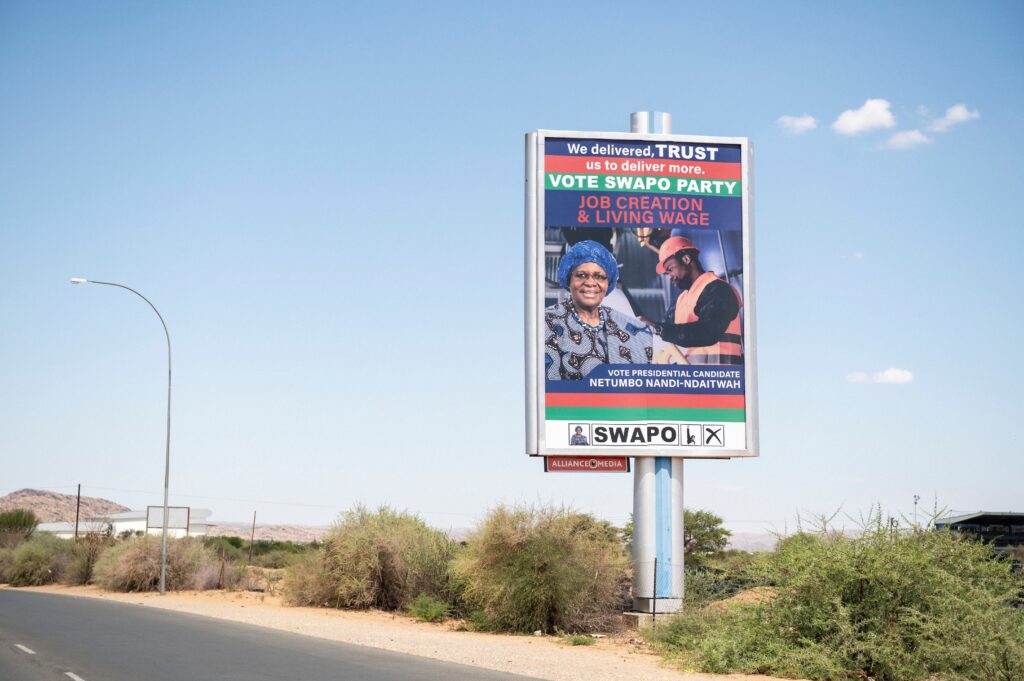Will Namibia be the next country in southern Africa to kick out a political party in power since independence?In a year that has proven fatal for many ruling parties across the region, Namibia’s election on November 27 is set to be a tight contest for the ruling South West Africa People’s Organisation (SWAPO). In the last six months, South Africa’s African National Congress lost its parliamentary majority for the first time since the end of apartheid. The Botswana Democratic Party was ousted after almost six decades in power, and though the ruling Frelimo won recent elections in Mozambique, civil society and opposition groups have demonstrated for weeks claiming fraud and demanding change. Apart from Botswana, “these are countries that had their liberation much later than a lot of the other countries on the continent”, said Nic Cheeseman, professor specialised in African politics at the University of Birmingham. Namibia gained independence in 1990, while Mozambique’s civil war ended in 1992 and South Africa’s first free elections were in 1994. Today, it is those known as the “born free” — after independence — who represent a large chunk of the electorate. “They don’t remember the liberation struggle, the solidarity and loyalty to the party that was generated then,” said Cheeseman. “For many people who are older perhaps, they are more willing to sacrifice and to accept poor performance.”- Digital natives -If younger voters are turning away from the parties that liberated their country, it is often because of their poor record, particularly on the economy.In Namibia, unemployment was estimated at 46 percent among 15-34 year olds, according to the latest figures from 2018 — almost triple the national average. “Those parties have been seen to be failing to provide for the people. Jobs in general are a challenge, the youth are not working,” said Tendai Mbanje, an election expert at the Johannesburg-based African Centre for Governance.In addition to high unemployment, “born free” voters are also digital natives — a key aspect of Mozambique’s ongoing post-election contestation, where opposition leader Venancio Mondlane has used social media to communicate with his supporters. This has been “a game changer” according to Mbanje.”Mainline media is traditionally controlled by the state in these countries… now young people can express themselves freely online.”To further their appeal with young people, politicians like Mondlane, who is 50, or Botswana’s new president Duma Boko, who is 54, have also tried to modernise their appearance. Mondlane has grown his hair -– a style mocked by Frelimo supporters who publish fake pictures of him holding a shampoo bottle –- and Boko, who dons a clean-shaved haircut, has shared multiple photos of him in sports clothes. “Optics matter in politics,” said Mbanje. “Political figures looking young will always resonate with young people.”- Transitional justice -But it’s not just young people turning away from freedom movements that have struggled to fulfil their promises. In South Africa, “for the older generation there is this sense of a lack of transitional justice after so long of the ANC being in power”, said Christopher Vandome, senior research fellow with the Chatham House Africa Programme. “There is this frustration around the parties being seen to have kind of enriched themselves and not delivered for ordinary people.” And it’s not just South Africa. Corruption scandals have tainted almost all of the liberation-era parties in the region that have also failed to deliver on promised land redistributions. As Namibian voters prepare to cast their ballots, will they be influenced by the changes sweeping the region?”Namibians looking south over the border, they’re going to be thinking… If we turn out and if we vote, it can instigate change,” said Vandome. “With this wave of transitions that’s occurred, I think that SWAPO will be really nervous.”
